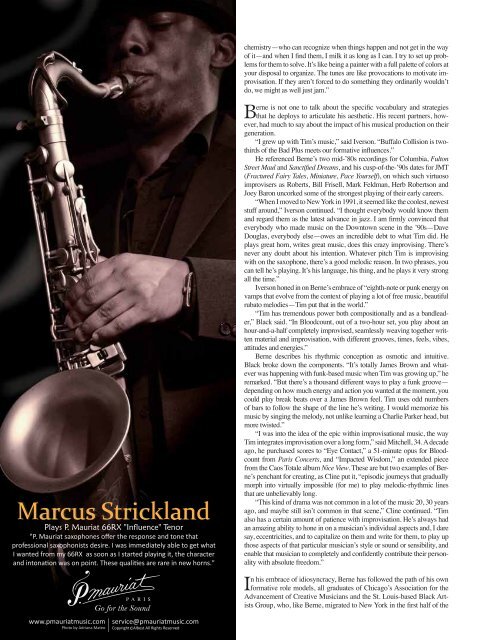Download - Downbeat
Download - Downbeat
Download - Downbeat
Create successful ePaper yourself
Turn your PDF publications into a flip-book with our unique Google optimized e-Paper software.
34 DOWNBEAT OCTOBER 2010<br />
chemistry—who can recognize when things happen and not get in the way<br />
of it—and when I find them, I milk it as long as I can. I try to set up problems<br />
for them to solve. It’s like being a painter with a full palette of colors at<br />
your disposal to organize. The tunes are like provocations to motivate improvisation.<br />
If they aren’t forced to do something they ordinarily wouldn’t<br />
do, we might as well just jam.”<br />
Berne is not one to talk about the specific vocabulary and strategies<br />
that he deploys to articulate his aesthetic. His recent partners, however,<br />
had much to say about the impact of his musical production on their<br />
generation.<br />
“I grew up with Tim’s music,” said Iverson. “Buffalo Collision is twothirds<br />
of the Bad Plus meets our formative influences.”<br />
He referenced Berne’s two mid-’80s recordings for Columbia, Fulton<br />
Street Maul and Sanctified Dreams, and his cusp-of-the-’90s dates for JMT<br />
(Fractured Fairy Tales, Miniature, Pace Yourself), on which such virtuoso<br />
improvisers as Roberts, Bill Frisell, Mark Feldman, Herb Robertson and<br />
Joey Baron uncorked some of the strongest playing of their early careers.<br />
“When I moved to New York in 1991, it seemed like the coolest, newest<br />
stuff around,” Iverson continued. “I thought everybody would know them<br />
and regard them as the latest advance in jazz. I am firmly convinced that<br />
everybody who made music on the Downtown scene in the ’90s—Dave<br />
Douglas, everybody else—owes an incredible debt to what Tim did. He<br />
plays great horn, writes great music, does this crazy improvising. There’s<br />
never any doubt about his intention. Whatever pitch Tim is improvising<br />
with on the saxophone, there’s a good melodic reason. In two phrases, you<br />
can tell he’s playing. It’s his language, his thing, and he plays it very strong<br />
all the time.”<br />
Iverson honed in on Berne’s embrace of “eighth-note or punk energy on<br />
vamps that evolve from the context of playing a lot of free music, beautiful<br />
rubato melodies—Tim put that in the world.”<br />
“Tim has tremendous power both compositionally and as a bandleader,”<br />
Black said. “In Bloodcount, out of a two-hour set, you play about an<br />
hour-and-a-half completely improvised, seamlessly weaving together written<br />
material and improvisation, with different grooves, times, feels, vibes,<br />
attitudes and energies.”<br />
Berne describes his rhythmic conception as osmotic and intuitive.<br />
Black broke down the components. “It’s totally James Brown and whatever<br />
was happening with funk-based music when Tim was growing up,” he<br />
remarked. “But there’s a thousand different ways to play a funk groove—<br />
depending on how much energy and action you wanted at the moment, you<br />
could play break beats over a James Brown feel. Tim uses odd numbers<br />
of bars to follow the shape of the line he’s writing. I would memorize his<br />
music by singing the melody, not unlike learning a Charlie Parker head, but<br />
more twisted.”<br />
“I was into the idea of the epic within improvisational music, the way<br />
Tim integrates improvisation over a long form,” said Mitchell, 34. A decade<br />
ago, he purchased scores to “Eye Contact,” a 51-minute opus for Bloodcount<br />
from Paris Concerts, and “Impacted Wisdom,” an extended piece<br />
from the Caos Totale album Nice View. These are but two examples of Berne’s<br />
penchant for creating, as Cline put it, “episodic journeys that gradually<br />
morph into virtually impossible (for me) to play melodic-rhythmic lines<br />
that are unbelievably long.<br />
“This kind of drama was not common in a lot of the music 20, 30 years<br />
ago, and maybe still isn’t common in that scene,” Cline continued. “Tim<br />
also has a certain amount of patience with improvisation. He’s always had<br />
an amazing ability to hone in on a musician’s individual aspects and, I dare<br />
say, eccentricities, and to capitalize on them and write for them, to play up<br />
those aspects of that particular musician’s style or sound or sensibility, and<br />
enable that musician to completely and confidently contribute their personality<br />
with absolute freedom.”<br />
In his embrace of idiosyncracy, Berne has followed the path of his own<br />
formative role models, all graduates of Chicago’s Association for the<br />
Advancement of Creative Musicians and the St. Louis-based Black Artists<br />
Group, who, like Berne, migrated to New York in the first half of the

















